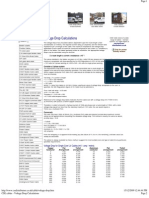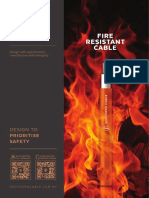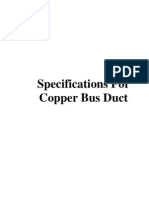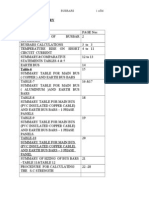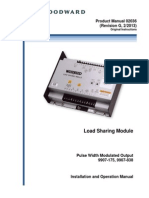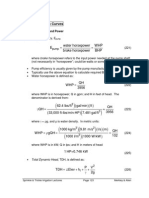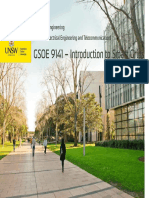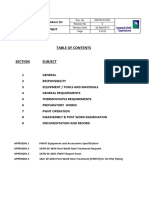0 ratings0% found this document useful (0 votes)
164 viewsBusbar Design
Busbar Design
Uploaded by
gusgifThis document discusses the design basics of copper busbars. It notes that copper is well-suited for busbars due to its high electrical and thermal conductivity, strength, and ease of joining. It then covers how to determine current ratings for busbars based on working temperature, heat loss through convection and radiation, and heat generated by current. Finally, it discusses calculating the optimal economic size of busbars by balancing material, installation, and lifetime energy costs.
Copyright:
Attribution Non-Commercial (BY-NC)
Available Formats
Download as PPT, PDF, TXT or read online from Scribd
Busbar Design
Busbar Design
Uploaded by
gusgif0 ratings0% found this document useful (0 votes)
164 views25 pagesThis document discusses the design basics of copper busbars. It notes that copper is well-suited for busbars due to its high electrical and thermal conductivity, strength, and ease of joining. It then covers how to determine current ratings for busbars based on working temperature, heat loss through convection and radiation, and heat generated by current. Finally, it discusses calculating the optimal economic size of busbars by balancing material, installation, and lifetime energy costs.
Original Description:
busbar in power plant
Copyright
© Attribution Non-Commercial (BY-NC)
Available Formats
PPT, PDF, TXT or read online from Scribd
Share this document
Did you find this document useful?
Is this content inappropriate?
This document discusses the design basics of copper busbars. It notes that copper is well-suited for busbars due to its high electrical and thermal conductivity, strength, and ease of joining. It then covers how to determine current ratings for busbars based on working temperature, heat loss through convection and radiation, and heat generated by current. Finally, it discusses calculating the optimal economic size of busbars by balancing material, installation, and lifetime energy costs.
Copyright:
Attribution Non-Commercial (BY-NC)
Available Formats
Download as PPT, PDF, TXT or read online from Scribd
Download as ppt, pdf, or txt
0 ratings0% found this document useful (0 votes)
164 views25 pagesBusbar Design
Busbar Design
Uploaded by
gusgifThis document discusses the design basics of copper busbars. It notes that copper is well-suited for busbars due to its high electrical and thermal conductivity, strength, and ease of joining. It then covers how to determine current ratings for busbars based on working temperature, heat loss through convection and radiation, and heat generated by current. Finally, it discusses calculating the optimal economic size of busbars by balancing material, installation, and lifetime energy costs.
Copyright:
Attribution Non-Commercial (BY-NC)
Available Formats
Download as PPT, PDF, TXT or read online from Scribd
Download as ppt, pdf, or txt
You are on page 1of 25
David Chapman
Copper Development Association
david.chapman@copperdev.co.uk
Copper Development Association
Busbar Design Basics
www.leonardo-energy.org
Copper Development Association
www.cda.org.uk
High electrical conductivity
only silver is better than copper
Good thermal conductor
heat reaches surface quickly
Strong (at working temperature)
to withstand short circuit stresses
low creep
Easy to joint
resistant to corrosion
Materials for Busbar Systems
www.leonardo-energy.org
Copper Development Association
www.cda.org.uk
Busbar System Current Ratings
Busbar ratings are determined only by the
maximum desired working temperature
At working temperature:
heat generated = heat lost
www.leonardo-energy.org
Copper Development Association
www.cda.org.uk
Busbar System Current Ratings
Busbar ratings depend on:
Working and ambient temperatures
Heat lost from the busbar
by convection
by radiation
Heat generated in the busbar
www.leonardo-energy.org
Copper Development Association
www.cda.org.uk
25 . 0
25 . 1
66 . 7
v
P
cv
u
=
Power dissipated by convection is given by:
where
u is the temperature rise above ambient
v is the vertical height of the surface
Busbar System Current Ratings
P
cv1
P
cv2
v
www.leonardo-energy.org
Copper Development Association
www.cda.org.uk
Power dissipation per metre length v Vertical height
0
40
80
120
160
0 50 100 150 200
Vertical height (mm)
P
o
w
e
r
d
i
s
s
i
p
a
t
i
o
n
p
e
r
m
e
t
r
e
l
e
n
g
t
h
(
W
)
Convection (for 80 C temperature rise)
Busbar System Current Ratings
www.leonardo-energy.org
Copper Development Association
www.cda.org.uk
Power dissipated by radiation is given by:
( )
8 4
1
4
2
10 7 . 5
= T T P
r
c
where
P
r
is the power dissipated per square metre
T
2
is the working temperature, K
T
1
is the ambient temperature, K
c is the emissivity
Busbar System Current Ratings
P
r
P
r
www.leonardo-energy.org
Copper Development Association
www.cda.org.uk
The emissivity, c, describes how effectively
the surface radiates heat
For a perfectly polished surface, the value is
close to zero - a very poor radiator
For a matt black surface, the value is close to
1 - a very good radiator
Busbar System Current Ratings
www.leonardo-energy.org
Copper Development Association
www.cda.org.uk
Bright copper has an emissivity of about 0.1
During use, the emissivity of the copper
surface increases - and the current rating
increases - as the copper darkens to reach an
emissivity value of about 0.7
Tin plated copper has an emissivity of about
0.3 to 0.5
But painting bars reduces the current rating!
Busbar System Current Ratings
www.leonardo-energy.org
Copper Development Association
www.cda.org.uk
Busbar System Current Ratings
P
r
P
r
P
r
P
r
P
r
P
r
No radiation heat loss
from internal surfaces
www.leonardo-energy.org
Copper Development Association
www.cda.org.uk
Radiation power dissipation v Working temperature
0
20
40
60
80
100
273 323 373
Absolute Working Temperature (K)
P
o
w
e
r
d
i
s
s
i
p
a
t
i
o
n
(
W
p
e
r
s
q
m
)
Radiation (for 30 C ambient)
Busbar System Current Ratings
www.leonardo-energy.org
Copper Development Association
www.cda.org.uk
for 100 mm vertical height, 30 C ambient
Total power dissipation v Working temperature
0
100
200
300
400
500
600
700
800
900
1000
40 60 80 100 120 140
Working temperature (C)
P
o
w
e
r
d
i
s
s
i
p
a
t
i
o
n
(
W
p
e
r
s
q
m
)
Convection
Radiation
Total
Busbar System Current Ratings
www.leonardo-energy.org
Copper Development Association
www.cda.org.uk
R I P
2
=
a
l
I P
2
=
The power generated by current in the busbar is:
where
is the resistivity of the material
a is the cross sectional area
l is the length
Busbar System Current Ratings
www.leonardo-energy.org
Copper Development Association
www.cda.org.uk
At some temperature, the heat generated in the
busbar is equal to the total heat lost by convection
and radiation.
| | | |
r c i
P P P + =
Busbar System Current Ratings
www.leonardo-energy.org
Copper Development Association
www.cda.org.uk
Calculation method:
1 Select working and ambient temperatures
2 Assume initial current density of 8 amps/mm
2
3 Find appropriate size in standard range
4 Calculate heat generated due to current
5 Calculate heat loss at working temperature
6 If 4>5, increase size and return to 4
When 4=<5, this is smallest possible size
Minimum size calculation
www.leonardo-energy.org
Copper Development Association
www.cda.org.uk
The most economic size gives the lowest
lifetime cost. It is the minimum total cost of
material
installation and
energy costs
over the circuit lifetime.
Higher purchase cost - lower running costs
Best economic sizing
www.leonardo-energy.org
Copper Development Association
www.cda.org.uk
Best economic sizing
Cost of bar
0
5
10
15
0 100 200 300 400 500 600
Cross sectional area (sqmm)
C
o
s
t
o
f
b
a
r
p
e
r
m
e
t
r
e
(
$
)
www.leonardo-energy.org
Copper Development Association
www.cda.org.uk
Best economic sizing
Cost of losses - 5 years
0
10
20
30
0 100 200 300 400 500 600
Cross sectional area (sqmm)
C
o
s
t
o
f
l
o
s
s
e
s
o
v
e
r
5
y
e
a
r
s
(
$
)
www.leonardo-energy.org
Copper Development Association
www.cda.org.uk
Economic Sizing of Busbars
Total cost - 5 years
0
10
20
30
0 100 200 300 400 500 600
Cross sectional area (sqmm)
L
i
f
e
t
i
m
e
c
o
s
t
p
e
r
m
e
t
r
e
(
$
)
Cost of bar
Cost of loss
Total
www.leonardo-energy.org
Copper Development Association
www.cda.org.uk
Busbar calculation software
www.leonardo-energy.org
Copper Development Association
www.cda.org.uk
Busbar calculation software
www.leonardo-energy.org
Copper Development Association
www.cda.org.uk
Busbar calculation software
www.leonardo-energy.org
Copper Development Association
www.cda.org.uk
Further considerations
Having calculated the size of the bar, there
are three further considerations:
voltage drop
skin effect
increases apparent resistance by reducing
effective area - important for:
^ thick busbars
^ high frequencies
^ harmonics generated by non-linear loads
short circuit current
www.leonardo-energy.org
Copper Development Association
www.cda.org.uk
Summary of Busbar Material Characteristics
High Conductivity
low loss, low voltage drop
>101.5 % IACS
Easy Formability
due to small grain size and advanced production
technology
easy to bend without surface deformation
Good Flatness
simple reliable jointing
Good Straightness
easy installation, lower joint stress
David Chapman
Copper Development Association
david.chapman@copperdev.co.uk
Copper Development Association
You might also like
- AluminumPresentationIEEE (CompatibilityMode)Document31 pagesAluminumPresentationIEEE (CompatibilityMode)A. HassanNo ratings yet
- Practical Guide to International Standardization for Electrical Engineers: Impact on Smart Grid and e-Mobility MarketsFrom EverandPractical Guide to International Standardization for Electrical Engineers: Impact on Smart Grid and e-Mobility MarketsNo ratings yet
- Current Carrying Capacity of BusbarsDocument8 pagesCurrent Carrying Capacity of Busbarsrasheed313100% (1)
- Java wsd18 Operating Instructions ManualDocument18 pagesJava wsd18 Operating Instructions Manualjose luis peralesNo ratings yet
- Cummins FaultcodesDocument40 pagesCummins FaultcodesTocxoan Tocxoan100% (5)
- Electrical Risk AssessmentDocument6 pagesElectrical Risk AssessmentRaul Moyo100% (3)
- IEC-614391-1 &2 - For Switchgears - GMA-US - LRDocument12 pagesIEC-614391-1 &2 - For Switchgears - GMA-US - LRKapil GalwaniNo ratings yet
- Furse Catalogue-Lightning Protection PagesDocument55 pagesFurse Catalogue-Lightning Protection PagesWanessa Suárez100% (1)
- Lightning A Srrester Pecification - EngDocument6 pagesLightning A Srrester Pecification - EngBambang GunariNo ratings yet
- LV Switchboards 8PU + BusductsDocument18 pagesLV Switchboards 8PU + BusductssutanuprojectsNo ratings yet
- Electrical Example Details:: Permissible Voltage DropDocument5 pagesElectrical Example Details:: Permissible Voltage DropacecNo ratings yet
- Discussing About LV and HV Electrical Cables: EdvardDocument4 pagesDiscussing About LV and HV Electrical Cables: EdvardadauNo ratings yet
- International Standard: Norme InternationaleDocument11 pagesInternational Standard: Norme InternationaleСтанислав ПодольскийNo ratings yet
- CSE Cables - Voltage Drop CalculationsDocument2 pagesCSE Cables - Voltage Drop Calculationsjay512100% (1)
- Best Practices in Solar PhotovoltaicsDocument43 pagesBest Practices in Solar Photovoltaicsphilipnart100% (1)
- SC Fire Resistant Catalogue 2020Document16 pagesSC Fire Resistant Catalogue 2020Phua Shang YangNo ratings yet
- Copper Bus Duct SpecDocument135 pagesCopper Bus Duct SpecChilamkurti Siva Sankara Rao100% (2)
- Conductors Damage Curves CablesDocument4 pagesConductors Damage Curves Cablesnegrin100% (1)
- SLDDocument8 pagesSLDHARIS AHAMMEDNo ratings yet
- Sizing Junction BoxesDocument10 pagesSizing Junction BoxesYousif_AbdalhalimNo ratings yet
- Brochure SIMARIS Software ToolsDocument8 pagesBrochure SIMARIS Software ToolsDavid LovatoNo ratings yet
- Amtech Cable Sizing GuideDocument6 pagesAmtech Cable Sizing GuideKhanSA786No ratings yet
- Aluminum WiringDocument2 pagesAluminum WiringJorge Ignacio MVNo ratings yet
- Electrical Safety Standards For LVDocument10 pagesElectrical Safety Standards For LVmeshahanNo ratings yet
- Sizing of Power Cables For Circuit Breaker Controlled FeedersDocument15 pagesSizing of Power Cables For Circuit Breaker Controlled FeedersAlmir Mahmutovic100% (1)
- Determining The Circuit Breaker Size For Three-Phase InvertersDocument3 pagesDetermining The Circuit Breaker Size For Three-Phase InvertersBill BreakerNo ratings yet
- CT CalculationDocument13 pagesCT CalculationMuhammad Ibad AlamNo ratings yet
- Cable Sizing - Avoid Shortcuts and Do It RightDocument6 pagesCable Sizing - Avoid Shortcuts and Do It RightbencomanNo ratings yet
- MCC Enclosure CatalogueDocument12 pagesMCC Enclosure CatalogueBch Electric ltd100% (1)
- IECEE-CTL EQL 61439-6 - Ed10 - Rev0 PDFDocument4 pagesIECEE-CTL EQL 61439-6 - Ed10 - Rev0 PDFKuljinder VirdiNo ratings yet
- Volt DropDocument1 pageVolt DropMELVINNo ratings yet
- Short Circuit Cable SizingDocument4 pagesShort Circuit Cable Sizingsuresh8159No ratings yet
- Merlin Gerin Medium VoltageDocument10 pagesMerlin Gerin Medium VoltagekjfenNo ratings yet
- Lightning Protection: 2.0. Design BasisDocument4 pagesLightning Protection: 2.0. Design BasisVivek CNo ratings yet
- Busbar Differential ProtectionDocument2 pagesBusbar Differential Protectionnomy158No ratings yet
- Lec13 - LV Circuit BreakersDocument28 pagesLec13 - LV Circuit BreakersHolly CrossNo ratings yet
- Xlpe Cable Amps RatingDocument38 pagesXlpe Cable Amps RatingUthaya KumarNo ratings yet
- Shrink Polymer System - 24V To 36kV Cable Installation Materials PDFDocument68 pagesShrink Polymer System - 24V To 36kV Cable Installation Materials PDFMichael Parohinog Gregas100% (1)
- Conduit Fill CalculationDocument3 pagesConduit Fill CalculationCarl James GranadaNo ratings yet
- Enclosure Form of SegregationDocument18 pagesEnclosure Form of Segregationkkn1234No ratings yet
- Circuit BreakerDocument12 pagesCircuit BreakerHarshalPanchal100% (1)
- Hyundai Cast-Resin TransformerDocument16 pagesHyundai Cast-Resin TransformerDak Jeda100% (1)
- Electrician - Dictionary Hecho Por RafDocument20 pagesElectrician - Dictionary Hecho Por RafRaul PeitzNo ratings yet
- THD Total Harmonic DistortionDocument3 pagesTHD Total Harmonic DistortionVenkateshNo ratings yet
- 4e4a 7671 4E4A TABLEDocument1 page4e4a 7671 4E4A TABLEiqkhanukNo ratings yet
- A Case Study On Arc Flash StudyDocument8 pagesA Case Study On Arc Flash StudyBabuNo ratings yet
- Overvoltage Protection (Surge Arrester) (Surge Arrester)Document24 pagesOvervoltage Protection (Surge Arrester) (Surge Arrester)mas zak danielNo ratings yet
- Suspension Insulation String BuDocument11 pagesSuspension Insulation String BuM_D_MendisNo ratings yet
- Switchgear: Presented by Ajay Kumar Nikunj EMP NO-100326Document24 pagesSwitchgear: Presented by Ajay Kumar Nikunj EMP NO-100326SamNo ratings yet
- Discrimination SchneiderElectricDocument244 pagesDiscrimination SchneiderElectricaldodarNo ratings yet
- Earthing SystemsDocument51 pagesEarthing SystemsSihamaSihamNo ratings yet
- Compact Sub Station BrochureDocument8 pagesCompact Sub Station BrochureAnimesh SahaNo ratings yet
- Voltage Drop GuidelinesDocument4 pagesVoltage Drop Guidelinesindira_tungNo ratings yet
- Module Title:-Cable Calculation: o o o o o oDocument13 pagesModule Title:-Cable Calculation: o o o o o ocbradley87No ratings yet
- Guidelines For Schematic DiagramDocument19 pagesGuidelines For Schematic DiagramRaphael HoNo ratings yet
- Derating FactorDocument1 pageDerating Factorvivekgupta62No ratings yet
- LSF (Lsoh) Power Cable 600 1000v Xlpe Swa Bs6724 CableDocument6 pagesLSF (Lsoh) Power Cable 600 1000v Xlpe Swa Bs6724 CablerocketvtNo ratings yet
- Condensation in Switchgear and Anti-Condensation HeatersDocument3 pagesCondensation in Switchgear and Anti-Condensation HeaterswaniasimNo ratings yet
- Copper For Busbars-OrIENTAL CuDocument27 pagesCopper For Busbars-OrIENTAL Cutenk_man83% (6)
- Corrosion Training Design Part 11Document89 pagesCorrosion Training Design Part 11mtuanlatoi9704100% (1)
- Bus BarsDocument36 pagesBus Barstceterex100% (1)
- Bus Bar CalculationDocument5 pagesBus Bar CalculationSUJIT KUMAR MONDALNo ratings yet
- Busbar Sizing CalculationDocument5 pagesBusbar Sizing CalculationZaferullah Khan100% (1)
- Hint-How To Create Different Calendars in MS ProjectDocument4 pagesHint-How To Create Different Calendars in MS ProjectgusgifNo ratings yet
- I Gotta + (Verb) : 'I Have Got To' 'I've Got To'Document10 pagesI Gotta + (Verb) : 'I Have Got To' 'I've Got To'gusgifNo ratings yet
- Load Sharing Module WoodwardDocument36 pagesLoad Sharing Module WoodwardgusgifNo ratings yet
- Lossofexcitation 130805045350 Phpapp01Document52 pagesLossofexcitation 130805045350 Phpapp01ahvaz1392bNo ratings yet
- Differential Relay SettingDocument6 pagesDifferential Relay SettinggusgifNo ratings yet
- Modeling and Simulation of Reverse PowerDocument6 pagesModeling and Simulation of Reverse PowergusgifNo ratings yet
- Gek 34124GDocument24 pagesGek 34124GgusgifNo ratings yet
- Pumps and System CurvesDocument22 pagesPumps and System Curvesgusgif100% (1)
- Failure Analysis of 7500 HP MotorDocument6 pagesFailure Analysis of 7500 HP Motorgusgif100% (1)
- Modularization, Cohesion and CouplingDocument41 pagesModularization, Cohesion and CouplinggusgifNo ratings yet
- Day 3: Rest From WeightsDocument2 pagesDay 3: Rest From WeightsgusgifNo ratings yet
- Assembly Language Programming Assembly Language ProgrammingDocument27 pagesAssembly Language Programming Assembly Language ProgramminggusgifNo ratings yet
- Long 11 PPT 01Document32 pagesLong 11 PPT 01gusgif100% (1)
- Unit Normal VectorDocument0 pagesUnit Normal VectorgusgifNo ratings yet
- 12 Potensiometer PDFDocument13 pages12 Potensiometer PDFgusgifNo ratings yet
- APP Pumps: APP 0.6-1.0 / APP 1.5-3.5 / APP (W) 5.1-10.2 / APP 11-13 / APP 16-22 / APP 21-43Document42 pagesAPP Pumps: APP 0.6-1.0 / APP 1.5-3.5 / APP (W) 5.1-10.2 / APP 11-13 / APP 16-22 / APP 21-43Bear LoeraNo ratings yet
- 13 - ElectrochemistryDocument2 pages13 - Electrochemistrysuppalerk janechaijitravanitNo ratings yet
- ABN Coal SpecificationDocument1 pageABN Coal Specificationban bekasNo ratings yet
- Electric Dipole MomentDocument13 pagesElectric Dipole Momentdaredevil26No ratings yet
- CDL (CDLF) Vertical Mutistage Centrifugal PumpDocument48 pagesCDL (CDLF) Vertical Mutistage Centrifugal Pump戴姣No ratings yet
- Aspiradores Drive 18600nDocument36 pagesAspiradores Drive 18600njimalopoezNo ratings yet
- Catre en WebDocument300 pagesCatre en WebLokeshTripathiNo ratings yet
- Duratrax ICE Backlight ModificationDocument10 pagesDuratrax ICE Backlight ModificationJose PetecaNo ratings yet
- Evaluation of DTPPADocument130 pagesEvaluation of DTPPALaura Natalia SalcedoNo ratings yet
- Test and Analysis of Low Voltage Ride Through Characteristic of Wind FarmDocument6 pagesTest and Analysis of Low Voltage Ride Through Characteristic of Wind FarmStefania OliveiraNo ratings yet
- GSOE 9141 Introduction To Smart Grids v17.02.28Document81 pagesGSOE 9141 Introduction To Smart Grids v17.02.28Denny NovianNo ratings yet
- 03 MDM Cat-E 0010-12Document8 pages03 MDM Cat-E 0010-12Fernando LopezNo ratings yet
- Test Bank For Chemistry 7th Edition John e Mcmurry Robert C Fay Jill Kirsten RobinsonDocument34 pagesTest Bank For Chemistry 7th Edition John e Mcmurry Robert C Fay Jill Kirsten Robinsonagonize.sumerianmckeo100% (50)
- TransformerDocument7 pagesTransformersivaNo ratings yet
- Section Subject: Shaybah CPF Expansion ProjectDocument21 pagesSection Subject: Shaybah CPF Expansion ProjectAdhie Waelacxh100% (1)
- Find The Right Fuse!: What Are The Advantages of Using An Electrical Fuse?Document4 pagesFind The Right Fuse!: What Are The Advantages of Using An Electrical Fuse?ShirishNo ratings yet
- Posobie Teplovoj Raschet 1 1Document95 pagesPosobie Teplovoj Raschet 1 1abbeyNo ratings yet
- Global Cleantech Innovation Programme IndiaDocument122 pagesGlobal Cleantech Innovation Programme Indiaficisid ficisidNo ratings yet
- Failure Theories Von MisesDocument12 pagesFailure Theories Von Misesrezajun2820No ratings yet
- Epoxy Foam Encapsulation - Processing and Dielectric CharacternizationDocument63 pagesEpoxy Foam Encapsulation - Processing and Dielectric CharacternizationEugene PaiNo ratings yet
- Training Material Operasional Mitsubishi UNEJDocument35 pagesTraining Material Operasional Mitsubishi UNEJkhamid surajabNo ratings yet
- Smart Ups On Line Surt20krmxliDocument4 pagesSmart Ups On Line Surt20krmxliBambang HarjantoNo ratings yet
- A Review of Gas-Gas Heat Recovery SystemsDocument39 pagesA Review of Gas-Gas Heat Recovery SystemspinenamuNo ratings yet
- Solar Cells PHD ThesisDocument5 pagesSolar Cells PHD Thesisnicoleyoungaurora100% (2)
- Theme 12. OIL SYSTEMS OF GAS TURBINE ENGINESDocument74 pagesTheme 12. OIL SYSTEMS OF GAS TURBINE ENGINESОлег Олексійович ПогорілийNo ratings yet
- Invertor, Control Setting ValueDocument12 pagesInvertor, Control Setting ValueRey-an A. MorenoNo ratings yet













